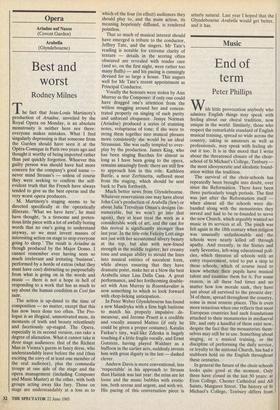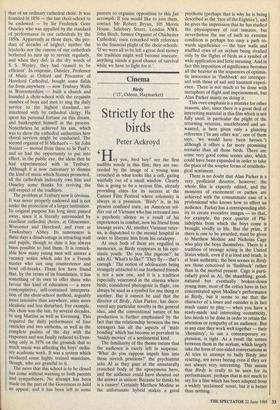Music
End of term
Peter Phillips
With little provocation anybody who admires English things may speak with
feeling about our choral tradition, now unique in the world. Similarly, those who respect the remarkable standard of English musical training, spread so wide across the country, taking in amateurs as well as professionals, may speak with feeling ab- out it too. It is in this mood that I write about the threatened closure of the choir- school of St Michael's College, Tenbury the most idiosyncratic and idealistic found- ation within the tradition.
The survival of the choir-schools has repeatedly been brought into doubt, ever since the Reformation. There have been three particularly tough periods. The first was just after the Reformation itself when almost all the schools were dis- banded along with the monasteries they served and had to be re-founded to serve the new Church, which arguably wanted no music in its services at all. The pinch was felt again in the 18th century when religion was unusually unfashionable and the schools were nearly killed off through apathy. And recently, in the Sixties and early Seventies, left-wing educational poli- cies, which threaten all schools with an entry requirement, tried to put a stop to these schools, which of course need to know whether their pupils have musical talent and examine them for it. For some reason, in all these bad times and no matter how low morale sank, they have just about all survived to the present day: 34 of them, spread throughout the country, some in most remote places. This is even more tenacious when one reflects that most European countries had such foundations attached to their monasteries in mediaeval life, and only a handful of them exist now, despite the fact that the monasteries them- selves may still be in use. Something about singing, or a musical training, or the discipline of performing the daily service, or loyalty to the national Church, has had a stubborn hold on the English throughout these centuries.
In general the future of the choir-schools looks quite good at the moment. Only three have closed in the last 50 years: at Eton College, Chester Cathedral and All Saints, Margaret Street. The history of St Michael's College, Tenbury differs from
that of an ordinary cathedral choir. It was founded in 1856 — the last choir-school to he endowed — by Sir Frederick Gore Ouseley who was appalled by the standard of performance in our cathedrals by the 1850s. Apparently in those days, the pro- duct of decades of neglect, neither the layclerks nor the canons of our cathedrals bothered to turn up to service regularly, and when they did, in the dry words of S. S. Wesley, they had 'ceased to be efficient'. In response, Ouseley, Professor of Music at Oxford and Precentor of Hereford Cathedral, bought some fields far from anywhere — now Tenbury Wells in Worcestershire — built a church and founded a choir-school with the requisite number of boys and men to sing the daily service to the highest standard, un- interfered with by cathedral clergy. He spent his personal fortune on this dream, and bankrupted himself in the process. Nonetheless he achieved his aim, which was to show the cathedral authorities how choral services might be conducted. The second organist of St Michael's — Sir John Stainer — moved from there to St Paul's, and so had the opportunity to put into effect, in the public eye, the ideas that he had experimented with in Tenbury. Although it is now customary to dismiss the kind of music which Stainer promoted, all the cathedrals indirectly owe him and Ouseley some thanks for reviving the self-respect of the tradition.
The problem at Tenbury now is obvious. It was never properly endowed and is not under the protection of a larger institution. Its original purpose has long since passed away, since it is literally surrounded by excellent cathedral choirs, at Gloucester, Worcester and Hereford, and even at Tewkesbury Abbey. Its remoteness is these days a disadvantage in attracting staff and pupils, though to date it has always been possible to find them. It is remark- able how many young men will answer a vacancy notice which asks for a French master who can sing countertenor and bowl off-breaks. These few have found that, by the terms of its foundation, it has something of its own to offer those who favour this kind of education — a more contemplative, self-contained interpreta- tion of the choir-school method, arguably more intensive than anywhere, since more idealistic and less disturbed. For example, this choir was the last, by several decades, to sing Mattins as well as Evensong. This required the daily performance of four canticles and two anthems, as well as the complete psalms of the day with the responses and was finally reduced to Even- song only in 1976 on the grounds that so much music was affecting the boys' ordin- ary academic work. It was a system which produced some highly trained musicians, though, who are grateful to it.
The news that this school is to be closed has come without warning to both parents and sympathisers. No attempt has been made on the part of the Governors to hold an appeal, and it has been left to some parents to organise opposition to this fait accompli. If you would like to join them, contact Mr Robert Bryan, 105 Morris House, Salisbury Street, London NW8. John Birch, former Organist of Chichester Cathedral, once remarked with reference to the financial plight of the choir-schools: 'If we were all to be left a great deal money the tradition might well become insecure; anything stands a good chance of survival while we have to fight for it.'















































 Previous page
Previous page